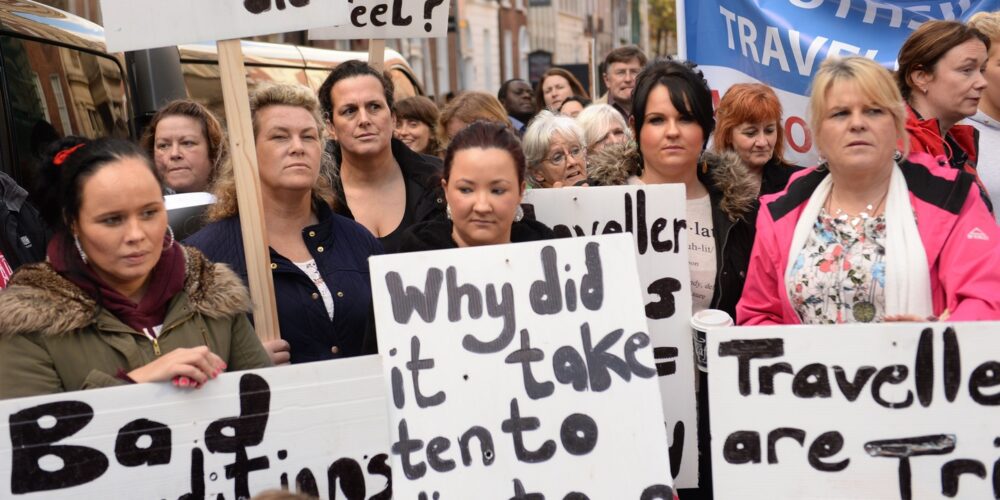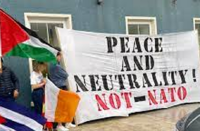Travellers, or Mincéirí, are a minority ethnic group indigenous to Ireland who have a shared language and culture. The biggest blight on “modern” Ireland, without question, is the treatment of the Travelling community. It is a continuing shame on the state and on society more generally.
Traditional Traveller occupations, such as tinsmithing (in the past they were often called Whitesmiths as a people, because of their trade), the recycling of metals, horse-trading, or more recently chimney-sweeping, have largely been made redundant by industrialised monopoly capitalism. This has forced Travellers either into social-welfare dependence or into cities to try to integrate in a working culture that doesn’t want them and that forces settled accommodation and patterns of routinised behaviour.
Legislation against Travellers, their lives and occupations was introduced by the British state in the sixteenth century, outlawing travelling from town to town peddling. In the 1920s and 30s the Irish state increasingly took public land for government use that had traditionally been used by the Travelling community. Conflict with the state was frequent, and continuous, over land use with the Gardaí and county councils, often violently, disrupting Traveller campsites that had been used for centuries without any understanding or recognition of this.
Regulations and laws that restricted camping and mobility increased, and this remains at the heart of discrimination and oppression today: a failure to recognise and accept the indigenous Mincéir way of life. Indeed Charles Haughey once stated that “there could be no final solution until itinerant families were absorbed into the general community.”
A report then recommended that all Travellers in the state needed to be “registered,” and social welfare was offered for twelve months to any Traveller willing to “settle” and get a “normal” job. Variations of this have been state policy since.
The state and capital have in effect worked together to leave these people in a state of oppressive and violent poverty.
56 per cent of Travellers reported that poor physical and mental health restricted normal daily activities; this was compared with 24 per cent of the General Medical Services (medical card) population. 63 per cent of Traveller women disclosed that their mental health was not good enough for one or more days in the previous thirty days, compared with 20 per cent of GMS female cardholders. Suicide rates are six times higher in the Travelling community than in the settled population. 50 per cent of Travellers die before their 39th birthday.
Let that sink in. It is a frightening reality. Traveller men have a life expectancy of 63 and women 70. These are significantly less than the settled population (78 for men and 82 for women).
And what prospect is there if a Traveller wants to get a job within the settled economy? A survey in 2004 found shocking attitudes to the Travelling community among the settled population. 72 per cent of the population agreed that they were not willing to accept Travellers among them.
With this level of racism prevalent, it is no surprise that the world of settled jobs is not an inviting place. 41 per cent of settled employers say they are not willing to employ a Traveller. In 2011 only 1 per cent of Travellers had a third-level degree.
There is 80 per cent unemployment among the Traveller population of working age. An Oireachtas committee has heard Travellers directly call for the public sector and the state to lead the way in the employment of Travellers, and participants from the community said it was a myth that Travellers didn’t want to work.
Pavee Point activists have also said that Travellers often have to hide or deny their ethnicity in order to get a job. One such Traveller security guard who did this was told repeatedly to watch out for Travellers, who steal. He eventually quit in anger.
The state needs to lead the way in positive employment of the Travelling community and in a way that accepts their culture. It must stop trying to force Travellers into a sedentary way of life. It needs to recognise and provide employment, and flexible employment mechanisms, both for those who wish to remain nomadic and for those who wish a sedentary way of life.
The private sector must also play a role and be made to provide greater flexibility. With technology and greater ability to work from varied locations and to work remotely, a more nomadic work force is possible, and this should be used to end discrimination against Travellers in employment.






